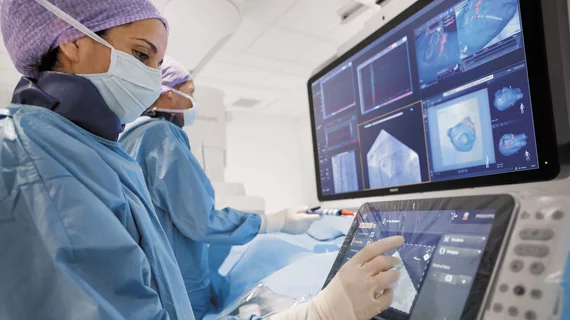Many physicians are unaware that interventional radiology is a distinct specialty
Many physicians who treat musculoskeletal disorders are unaware that interventional radiology is a distinct specialty of medicine.
That statistic is despite many of these physicians feeling that they have good or excellent knowledge of image-guided procedures, according to data published in Clinical Imaging.
In the new paper, experts detail the responses of orthopedic surgeons, physiatrists and rheumatologists across a 14-hospital health system pertaining to their knowledge of interventional radiology’s role in various musculoskeletal procedures. Although interventional radiology has been a primary specialty since 2021, the providers’ responses revealed that just 17% of them recognized it as such; the statistic could pose as a barrier to referrals for image-guided interventions for radiologists specializing in IR, authors of the new paper suggested.
“While clinical services offered by IR have become integral to the treatment of a diverse array of medical conditions, several medical specialties may not be aware of the breadth of treatment options currently being offered by IR,” co-first author of the study Sukjin Koh, with the Department of Radiology at Brigham and Women's Hospital in Boston, and colleagues noted. “In order for IRs to grow their practice and build referrals for novel MSK IR procedures, it is important to understand the knowledge of subspecialists treating these conditions and their referral patterns.”
The team had providers answer a 17-question survey to better understand their overall awareness relative to various aspects of IR and MSK radiology practices and clinical applications. In total, the survey was completed by 59 providers, 93% of whom were attendings.
The experts received a mixed bag of responses, but they did reveal a knowledge gap among physicians, not just with respect to whether they recognized IR as a distinct specialty, but also in their understanding of IR referrals in general.
According to the data, 17% of respondents cited issues with EMRs as a hindrance in creating IR referrals; 14% reported scheduling issues, while 11% cited difficulty in obtaining consultations and 10% acknowledged a lack of knowledge on MSK image-guided procedures. Referrals were reported to have been sent to other specialties by 11% of respondents.
Through the varied responses, the authors highlighted several areas where improvements can be made with regard to IR referrals. Some of those steps include increasing referring physicians’ awareness of the services IRs provide, streamlining consultation and referral processes via the EMR, and bringing light to medical literature that details interventions catered to the referring provider’s specific patient population.
The authors acknowledged that their study was limited based on the knowledge and culture of the institution in which it was conducted and that their results do not necessarily reflect the perceptions of providers in other geographic regions.
The abstract is available here.

